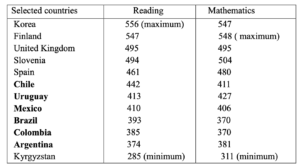We know that, in recent years, countries have made great strides in terms of access to education. However, going to school is not the same as learning. In many countries, there are children who reach the fourth grade without knowing how to subtract double digits and, around the world, there are millions of children who reach adulthood without acquiring the most basic skills, such as reading, writing or doing the most elementary operations.
The data from PISA-D (PISA for Development) in 2018, which measured the knowledge of 14 to 16 year olds in and out of school in developing countries, is shocking. Less than 10% achieve a minimum proficiency in mathematics (compared to an OECD average of 76% and 71% respectively). Three countries in the world, including Panama and the Dominican Republic, scored so low that a new level, called “Below Level 1”, had to be created. Only Uruguay, Chile, Mexico and Costa Rica had at least 40% of their students above the minimum level.

Source: PISA

Source: PISA and OCDE
The New Mathematical Competence
We are experiencing a learning crisis, and without learning, education cannot be what puts an end to extreme poverty, creates opportunities or promotes shared prosperity. So says the World Bank in its 2018 World Development Report: Learning in order to make the promise of education a reality. This crisis needs to be addressed by making sure that children actually learn the things they need to in order to have a prosperous future. What are these skills when it comes to mathematics? Are they still the same as they were a few years ago? How is maths being taught today in developing countries?
According to the OECD in its PISA 2021 Mathematics report: A Broadened Perspective, for most countries, mathematical competencies initially covered basic arithmetic skills (adding, subtracting, multiplying and dividing whole numbers, decimals and fractions); computational percentages; and calculating the area and volume of simple geometric shapes. However, as we have seen, in recent times, this perspective has been changing: the digitisation of many aspects of life, the ubiquity of data, and major societal issues such as climate change, population growth, the spread of pandemics and diseases, and the global economy, have turned what it means to be mathematically competent on its head. Today, mathematical literacy is about an individual’s ability to reason mathematically and to formulate, use and interpret mathematics in order to solve problems in a variety of real-world contexts. An awareness of the role mathematics plays in the world will help our students make the informed decisions needed to be constructive, engaged, reflective and critical 21st century citizens. In this post we saw how mathematics education needs to do a 180-degree turn all across the world. But what is the specific situation of mathematics in the classrooms of the most vulnerable countries? What is their starting point? How can we encourage the development of educational proposals in line with the proposals in the latest OECD report?
Latin America: Untapped Mathematical Talent
According to the latest report published by the International Commission on Mathematical Instruction (ICMI), the Latin American and Caribbean region has a great deal of untapped mathematical talent. However, there are many challenges and needs, some of which are mentioned below:
- Outdated methodologies: The education that most countries provide to their students is deficient. So much so that many children and adolescents do not acquire the minimum level of education necessary to be able to work productively. This study, funded by the Inter-American Development Bank, states that in many Latin American institutions mathematics teaching is limited to the memorisation of formulas and methodologies, without creating dynamics that help students extrapolate what they know and apply it in different contexts. This creates important knowledge gaps, which affect their studies later on.
- Social divide: Although there are many common characteristics among the countries of the region, there are significant differences in terms of educational opportunities which, in the vast majority of cases, are highly dependent on the purchasing power of families, with private schools having a better quality of education.
In its study, the ICMI argues that, by making better use of human and financial resources, some strategic actions could have a significant impact on the development of mathematics in the region. These actions include the following:
- Fostering the connection between maths and society, as the current disconnection hinders public and private investment in this discipline.
- Developing higher education and teacher training programmes.
- Promoting the Mathematical Olympiad.
- Increasing the involvement of mathematicians in maths education.
Mathematics in Africa: Great Hope for the Future
In this case, the report produced by the ICMI stresses that improving the education of young people in this discipline is the best thing that can be done for Africa’s future. The report, which highlights differences in size, population density and culture, nevertheless identifies some common issues affecting mathematical development. These are:
- The low number of maths teachers with master’s degrees or doctorates.
- Professional and geographical isolation of teachers, which limits their professional advancement.
- Low wages, negative social image and shortage of mentors.
- A high number of students demanding higher education.
- Deficient and outdated infrastructure and teaching materials.
- Classroom overcrowding.
- Teacher training, even at university or master’s level, is not standardised, due to the inability of governments to provide the necessary resources for training.
What can we do to address these challenges? The ICMI proposes the following actions in its report.
- Strengthening teaching at primary and secondary level.
- Give teachers recognition and reward mathematics careers.
- Increasing direct government support for teachers, universities and infrastructure.
- Strengthening and expanding training and research activities, with special attention to regional networking.
- Creating scholarships and grants for higher education.
Reducing the mathematical gap in the equation
In order to leave no one behind and allow all children around the world to compete on an equal footing, it is imperative to remove the maths gap from the equation. The need is great.
For example, according to the World Bank, mathematics education in developing countries requires special attention for three reasons: first, because the economic strength of a nation depends on the ability of its education system to produce mathematically literate workers and consumers; second, because, as we have seen, the mathematics learning deficit in these countries is enormous and shows little sign of diminishing; finally, because widespread negative attitudes towards mathematics, coupled with the expectation of failure, represent a major barrier to progress (Bethell, 2016).
In this same report, the World Bank itself offers some recommendations for lines of work to improve the teaching of mathematics in these regions and thus reduce the learning gap. Some of these are:
- Raising mathematics education to the status of a national priority. Governments should explicitly classify raising mathematics standards as a national priority and make this clear in national and ministerial strategic plans and education budgets.
- Changing negative attitudes towards mathematics. Although it may seem banal, these attitudes are one of the biggest barriers to learning mathematics and must be challenged through various actions in the education sector itself and in the general public: everyone can learn mathematics and does not need to be a genius or have an innate talent. Mathematical talent is cultivated.
- Improving initial teachers training. We have already seen in other articles how teachers training is another of the most significant barriers to learning mathematics. In this sense, it is essential to have an impact on the initial training of teachers and on how mathematics teaching is structured within the curricula of teacher training programmes.
- Supporting active teachers. We must also not neglect the needs of in-service teachers by strengthening in-service training programmes and supporting collaboration between teachers, which seems to be particularly important in promoting better teaching and learning.
- Promoting access to appropriate materials and resources. Although in many of these countries there is also a great need for physical books (properly evaluated), new technologies now offer the possibility of making a wealth of digital resources for learning the subject available to schools, families, students and teachers.
- Reliance upon the use of technology. The use of technology offers multiple advantages for the teaching of mathematics: access to resources and new methodologies, personalised and adaptive learning, gamification, learning communities, etc. ProFuturo Mathematics, a tool that combines the best of science and technology to put it at the service of mathematics learning, is a clear example of this. The use of technology should never be seen as a threat, but as an opportunity to raise achievement levels and quality of learning.
Reflection on the teaching and learning of mathematics in vulnerable environments raises some questions that open the door to further research. Let’s research new methodologies (gamification, manipulative mathematics, social learning of mathematics, etc.), let’s train teachers well (creation of communities, peer learning, use of digital tools for reinforcement and iteration, contextualised learning, etc.), let’s offer them resources (digital tools offer a wide range of applications, linkage with computational thinking). There is a lot of potential to tap into.
REFERENCES:
Work Bank. (2019). The learning crisis: Being in school is not the same as learning. https://www.bancomundial.org/es/news/immersive-story/2019/01/22/pass-or-fail-how-can-the-world-do-its-homework
Bethell, G. (2016). Mathematics education in Sub-Saharan Africa: Status, challenges, and opportunities. World Bank http://hdl.handle.net/10986/25289
Naslund-Hadley, E. and Bando, R. (2016). Every child counts. Early Mathematics and Science Education in Latin America and the Caribbean. IDB. At https://publications.iadb.org/publications/spanish/document/Todos-los-Niños-Cuentan-Enseñanza-temprana-de-las-matemáticas-y-ciencias-en-América-Latina-y-el-Caribe.pdf
ICMI. (2014). Mathematics Africa: Challenges and Opportunities. Commission for Developing Countries, International Mathematical Union https://www.mathunion.org/fileadmin/CDC/cdc-uploads/CDC_MENAO/Africa_Report.pdf
ICMI. (2014). Mathematics in Latin America and the Caribbean: Challenges and Opportunities. Commission for Developing Countries, International Mathematical Union https://www.mathunion.org/fileadmin/CDC/cdc-uploads/CDC_MENAO/Mathematics_in_Latin_America_and_the_Caribbean.Report.pdf
OECD. (2018). The PISA 2018 Results. https://www.oecd.org/pisa/publications/pisa-2018-results.htm






